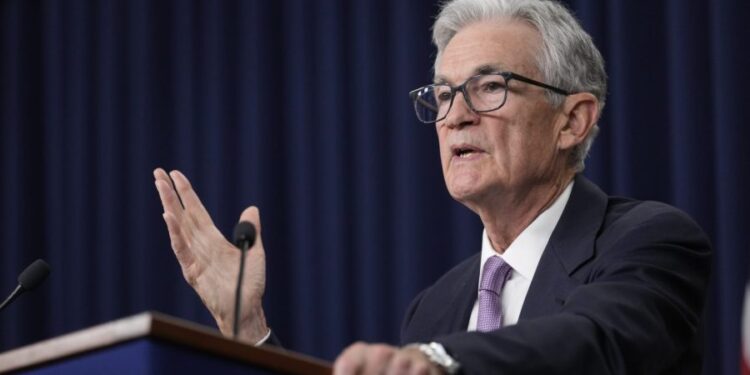
The Federal Reserve cut interest rates by a half-percentage point Wednesday and is projecting another half-percentage point cut over the course of its remaining two meetings this year, signaling a faster pace of monetary stimulus than analysts had been expecting over the summer.
The Fed expects the interbank lending rate to drop to a median level of 4.4 percent by the end of this year, down from 5.1 percent as projected in June.
The central bank is expecting a higher level of unemployment in the economy than it did in June, with the unemployment expectation rising to 4.4 percent through 2024 from 4.0 percent. Unemployment dipped slightly in August to 4.2 percent after bucking upward in July to 4.3 percent.
Inflation projections were accordingly lower, with the Fed dropping the 2024 personal consumption expenditures price index expectation from a 2.6 annual increase to a 2.3 percent increase. Inflation is projected to fall to 2.1 percent next year.
Federal Reserve Chair Jerome Powell pushed back Wednesday against assertions that the Fed’s larger interest rate cuts signaled the bank was behind the curve of the inflation trajectory, given downward revisions to recent employment data.
“We don’t think we’re behind,” he said. “We think this is timely, but I think you can take this as a sign of our commitment not to get behind.”
Analysts expressed surprise Wednesday at the magnitude of the Fed’s rate cut, saying it could indicate some perceived vulnerability in employment conditions.
“This is a bit of a surprise. The 50 [basis point] cut suggests an abrupt switch of focus back to the maximum employment mandate and a very sharp improvement in confidence in inflation progress in the last month and a half,” Brian Coulton, chief economist at Fitch Ratings, said in a commentary.
“It suggests that the Fed may be more concerned than most about the state of the labor market, where the pace of job creation still looks pretty solid (averaging 116k a month over the last 3 months),” he added.
Elizabeth Renter, senior economist at Nerd Wallet, said the bigger rate cut suggested that the Fed was perceiving potential weakness in labor data.
“Today’s move is larger than many anticipated, signaling the Fed is erring on the side of caution as it relates to softening in the labor market,” she wrote in a commentary. “The economy is actively slowing and a smaller rate cut may have been too timid. By cutting a half of a percentage point now, there’s little doubt Fed Chair Powell and colleagues are confident in inflation’s progress and sense some warning signs in the data.”
Other analysts pointed out that the Fed’s larger rate cut signaled they were trying to learn from past mistakes.
“The Fed was behind the curve when raising interest rates to corral inflation and the lesson appears to have been learned,” Greg McBride, financial analyst with Bankrate, wrote in a commentary.
Powell said Wednesday that the “labor market is still in solid shape” but acknowledged that it was “not a source of elevated inflationary pressures.”
The unemployment rate has stayed low in absolute terms even as interest rates rose over the course of 2022 and 2023 and as inflation fell from a high of 9 percent in 2022 down to 2.5 percent as of August.
That low level was maintained in large part because the number of job openings fell relative to the number of people out of work, as opposed to tighter investment conditions leading to a broad loss of jobs.
But Powell cautioned Wednesday that the reduced ratio of job openings to job seekers, which is now at roughly 1-to-1, was now at a point where further reductions in openings will manifest more quickly as an increase in the unemployment rate, a scenario referenced in a lot of Wednesday market commentary.
“It appears that we’re very close to that point, if not at it, so that further declines in job openings will translate more directly into unemployment,” Powell said, also noting that an influx of immigration likely also contributed to the rapid filling of open positions. Earlier this year, the Congressional Budget Office measured 1.6 million more immigrants than regular census estimates.
Powell described the tightening of employment conditions as a “great ride down.”
“We’ve seen a lot of tightness come out of the labor market in that form without it resulting in lower employment,” he added.
While interest rate cuts have already been baked into markets, the new macroeconomic moment of falling interest rates ushered in Wednesday is already having an effect on political discourse, with Democrats cheering on the economically stimulative effects of cheaper money.
“I applaud the Federal Reserve for making the necessary decision to cut interest rates by 50 basis points,” Rep. Maxine Waters (Calif.), top Democrat on the House Financial Services Committee, said in a statement. “Inflation is close to its pre-pandemic rates, supply chain strains have eased, employers are hiring, and Americans are spending money as they did before the pandemic. Put simply, the economy is well on a stable path to full recovery.”
Top Ways and Means Committee Democrat Rep. Richard Neal (Mass.) put out some similarly laudatory remarks about the state of the economy.
“We drove down unemployment and have maintained near-record lows while stamping out global inflation. Today, monetary policy is rightfully shifting to reflect that progress, and soon, the American people will feel relief from lower borrowing costs,” he wrote.
The Federal Reserve also brought its projections for the overall performance in the economy down by just a hair, dropping change in real gross domestic product (GDP) down from a 2.1 percent expectation to 2 percent. GDP estimates for 2025 and 2026 remained unchanged at 2 percent annual growth.






